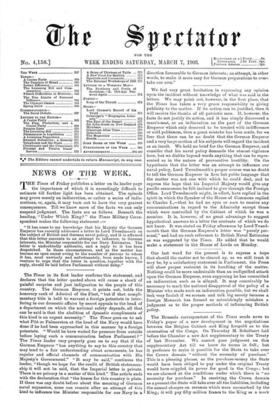We feel very great hesitation in expressing any opinion upon
the incident without knowledge of what was said in the letters. We may point out, however, in the first place, that the Times has taken a very grave responsibility in giving publicity to the matter. If its action can be justified, then it will receive the thanks of all patriotic men. If, however, the facts do not justify its action, and it has simply discovered a mare's-nest, or an indiscretion on the part of the German Emperor which only deserved to be treated with indifference or cold politeness, then a great mistake has been made, for we fear that there can be no doubt that the German Emperor and a very large section of his subjects will regard the incident as an insult. We hold no brief for the German Emperor, and consider that his naval policy demands the utmost vigilance here, but we dislike beyond words anything that can be repre- sented as in the nature of provocative hostility. On the hypothesis that the letter was an attempt to influence our naval policy, Lord Tweedmouth's proper course was no doubt to tell the German Emperor in firm but polite language that the matter was not one with which he could deal, and to express the hope that his Imperial Majesty would give any pacific assurances he felt inclined to give through the Foreign Office. Lord Tweedmouth might, in effect, have replied in the spirit in which the Speaker of the House of Commons replied to Charles I.,—that he had no eyes or ears to receive any communications in regard to the Admiralty except those which were controlled by the Cabinet of which he was a member. It is, however, of no great advantage to suggest hypothetical answers to a letter the contents of which we do not know. It was stated on Friday afternoon by Lord Tweed. mouth that the German Emperor's letter was "purely per- sonal," and had no such reference to British Naval Estimates as was suggested by the Times. He added that he would make a statement in the House of Lords on Monday.














































